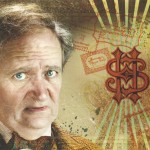Could Lumos Have Made a Difference for Tom Riddle? Discussing Voldemort on His 90th Birthday

Dec 31, 2016
Character Birthdays, Fans, FAQs, Harry Potter and the Half Blood Prince, J.K. Rowling, Lumos, News, Pottermore, Science
As Harry Potter aficionados know, the sixth installment in the series is “riddled” with details of Voldemort’s family history.
A few weeks ago J.K. Rowling and creator of the blockbuster musical Hamilton, Lin Manuel Miranda, exchanged tweets about their respective fondness for Harry Potter and the Half Blood Prince:
HBP is my favorite PRECISELY because of this reprise of Dumbledore's "You are with me" at the beginning.
You're deadly w a reprise, maestro. https://t.co/PGC5C6p4Ki— Lin-Manuel Miranda (@Lin_Manuel) December 8, 2016
Cannot tell you what this means (from you), because this moment is one of my very favourites. Always feel HBP gets overshadowed by DH… https://t.co/94cwNSCa2H
— J.K. Rowling (@jk_rowling) December 8, 2016
On this, the 90th anniversary of Tom Riddle’s birth, we’ll take a deeper look into the information we’ve gathered since Half Blood Prince / Deathly Hallows, to find out what triggered young Tom Riddle’s transmutation into one of the most evil literary characters of all time.
Most Harry Potter fans have Voldemort’s family tree committed to memory, but for purposes of this article, let’s review the circumstances leading to his birth:
Mr. and Mrs. Riddle, and their son, Tom (Voldemort’s ‘father’) were a rich family living in the town of Little Hangleton, with a large house, vast amounts of land and were – like the Dursleys – exceedingly snobbish. This meant they were rather unpopular with the locals, and, as we know from Half Blood Prince, Tom Riddle (Sr) was no stranger to the indulgent lifestyle of the Riddle family.
Merope Gaunt came from a family fighting to keep their line pureblood. The Gaunts were the last known descendants of Salazar Slytherin, and reduced to poverty due to exceeding violence and imprisonment. Morfin’s hexing of Tom Riddle Sr upon noticing Merope’s affection for him, as well as his and his father – Marvolo Gaunt’s – disregard of the Ministry led to their imprisonment in Azkaban, leaving Merope free from their constant watchful eyes and abuse.
Though Tom Riddle was infatuated with another woman, this didn’t stop Merope from giving him a love potion, leading to their marriage and Merope’s pregnancy, throughout which she continued to sneakily give him love potions. However, believing that Tom would love her or feel for their unborn child, she stopped administering the love potion sometime after her pregnancy.
He left her, desperate and with only the locket of Salazar Slytherin to her name, which she sold in an attempt to make ends meet. She died shortly after giving birth, leaving Tom Marvolo Riddle – later to become the horrific Lord Voldemort – in a muggle orphanage, alone.

We know that Tom spent his early formidable years at Wool’s Orphanage, a place he despised returning to after he matriculated at Hogwarts, and what Harry described as “a grim place in which to grow up.”
There have been a handful of different commentaries written on the theories behind Tom Riddle’s transformation into the heinous Voldemort, and his propensity towards malevolence, like this article (on Merope Gaunt) from Pottermore:
“It might be argued that Voldemort grew up devoid of love because his mother died for want of it, and that his father’s love was stolen rather than earned. Perhaps if he’d had any understanding of the difference between genuine love and the kind that you compel, Voldemort might have had a better grasp of its power. Luckily for Harry, he did not.”
Also from this online question and answer session with J.K. Rowling herself, first reported on by Leaky in 2007:
Ravleen: How much does the fact that Voldemort was conceived under a love potion have to do with his non-ability to understand love is it more symbolic?
J.K. Rowling: It was a symbolic way of showing that he came from a loveless union – but of course, everything would have changed if Merope had survived and raised him herself and loved him.
J.K. Rowling: The enchantment under which Tom Riddle fathered Voldemort is important because it shows coercion, and there can’t be many more prejudicial ways to enter the world than as the result of such a union.
Rowling once described Voldemort as a “raging psychopath, devoid of the normal human responses to other people’s suffering.”
According to an article entitled “The Hidden Suffering of the Psychopath”, from the October 2014 issue of the Psychiatric Times:
“Psychopathy is characterized by diagnostic features such as…lack of remorse or shame, grandiose sense of self-worth, pathological lying, manipulative behavior, juvenile delinquency and criminal versatility, among others.”
The article also explains, however, that psychopaths can experience emotional suffering as well:
“As with anyone else, psychopaths have a deep wish to be loved and cared for. This desire remains frequently unfulfilled, because it is obviously not easy for another person to get close to someone with such repellent personality characteristics…The life history of psychopaths are often characterized by a chaotic family life, lack of parental attention and guidance…Despite their outward arrogance, psychopaths feel interior to others and know they are stigmatized by their own behavior…Social isolation, loneliness, and associated emotional pain in psychopaths may precede violent criminal acts.”
The information from the book, “Analyzing Criminal Minds: Investigative Science for the 21st Century” also gives some insight into the loneliness which may have motivated Tom Riddle’s nefarious behavior:
“A boy entering puberty needs a strong, stabilizing figure in his life. A boy needs a loving father…Absent fathers produce anger, embarrassment, and worst of all loneliness…Isolated and lonely feelings from lifelong emotional scarcity characterize a salient feature of psychopathy.”
This combination of canon and psychological science seems to point to a connection between Tom’s lack of family and resulting institutionalization and his villainous tendencies, ultimately stemming from profound isolation and instability.
Adding to this argument, the very woman who penned this saga established the organization Lumos, whose purpose it is to help institutionalized children, including orphans, transition from institutional settings to a more family oriented ways of life.
According to the Lumos website:
“Lumos works to support the 8 million children in institutions worldwide to regain their right to a family life and to end the institutionalisation of children. Institutionalisation denies children individual love and care, can damage their brain development, and destroy their understanding of right and wrong.”
Earlier this week, Leaky reported on Harry Potter films stars Evanna Lynch’s and Bonnie Wright’s visit to Lumos’ programs in Haiti. Click here to read the article and watch a video documenting their trip. During the poignant and informative message about the work Lumos is doing in Haiti, Evanna says,
“Without family and without love, children can’t be children. The most important thing as a child is to be with your family.”
Rowling herself also constantly gives her voice to the campaign, in a recent Christmas message on the Lumos website, Jo gave thanks to those supporting the cause, and further reinstated that children should be with loving families (read the message here):
Pls RT: Children need families, not orphanages! Why I believe we
can end the institutionalisation of children http://t.co/s1pVQtHyf0 @lumos— J.K. Rowling (@jk_rowling) April 9, 2015
Even though 80-90% of the children that Lumos serves are not orphans, is it possible that Lumos could have been a real world solution to Tom Riddle’s disastrous metamorphosis into one of the most infamous fictional villains in history? Could the services and programs they provide have counteracted his escalation from lonely, angry, child to coldblooded killer?
An essay from the Leaky archives entitled “The Power the Dark Lord Knows Not” discusses J.K. Rowling’s explanation that Voldemort has never loved or cared for anyone:
“If he had, he couldn’t possibly be what he is,”she explains. This lack of love is the root of his evil nature and what has allowed him to be the kind of person who murders indiscriminately and who focuses what little life he has on dominating others and avoiding his own death.
In the same piece, there is a line from Dumbledore that reads:
“Lord Voldemort has never had a friend, nor do I believe that he has ever wanted one.”
The Psychiatric Times quote above asserts that psychopaths have a deep wish to be loved and cared for. If this is indeed accurate, perhaps Lumos and the people associated with it could have cultivated a different nature in Tom Riddle. The fact that this may have been possible for one of the most despicable fictional murderers of all time proves that Lumos is making a significant impact worldwide on the lives of children who have had similar life experiences and lived in isolation.
We thought Voldemort’s 90th birthday was an opportune time to ask the question. All thoughts are welcome, even those in Parseltongue!





